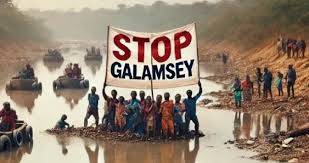What Should Ghanaians Expect from Trade Unions if the Government Fails to Address Illegal Galamsey Mining?
The illegal mining phenomenon, commonly referred to as "galamsey," has become a significant issue in Ghana, threatening the nation’s natural resources, environment, and social fabric. The government has repeatedly issued warnings and taken measures to curb these activities, yet they persist. If the government continues to ignore the mounting concerns surrounding illegal galamsey mining, Ghanaians can expect trade unions to take a more proactive role in addressing the implications of this crisis.
The Current Landscape of Galamsey
Galamsey has surged in popularity due to the allure of quick profits from gold mining, especially among impoverished communities. This activity has led to devastating consequences, including environmental degradation, destruction of water bodies, and significant health risks for surrounding populations. Despite government efforts, including task forces and public campaigns against illegal mining, the problem remains entrenched. As public frustration grows, the role of trade unions could become increasingly vital.
Trade Unions as Advocates for Workers' Rights
Trade unions in Ghana represent various sectors, including miners, farmers, and workers affected by illegal mining practices. If the government fails to effectively address illegal galamsey, trade unions are likely to escalate their advocacy efforts. They will likely call for:
1. **Stricter Regulations and Enforcement:** Unions may push for comprehensive legislation that not only targets illegal mining but also promotes sustainable practices. They could demand the establishment of clear guidelines that ensure legal miners can operate without the threat posed by illegal counterparts.
2. **Protection for Affected Workers:** Many workers in legal mining operations may find their jobs threatened by the unchecked growth of galamsey. Trade unions are expected to advocate for job security and alternative employment opportunities for these workers. This could involve retraining programs and the promotion of sustainable mining practices.
3. **Community Engagement and Support:** Trade unions may work to mobilize communities affected by galamsey to voice their concerns and demands. This could include organizing forums, protests, or campaigns to raise awareness about the adverse effects of illegal mining and to demand government action.
Possible Forms of Action
If the government remains unresponsive, trade unions may resort to various forms of action:
1. **Strikes and Protests:** Unions may organize strikes to draw attention to the government's inaction. These strikes could involve workers from various sectors, signaling widespread discontent and urging the government to take immediate action.
2. **Public Campaigns and Advocacy:** Trade unions could engage in public advocacy campaigns, using social media, traditional media, and public demonstrations to raise awareness about the dangers of illegal mining. They could collaborate with environmental groups to amplify their message and call for sustainable practices.
3. **Legal Action:** In extreme cases, unions may consider legal avenues to challenge the government’s failure to enforce existing mining laws. This could involve filing lawsuits or petitions that highlight the negative impacts of galamsey and demand governmental accountability.
The Broader Implications for Society
The failure to address illegal galamsey has implications beyond the mining sector. It affects public health, the environment, and the overall economy. Trade unions could play a crucial role in bridging gaps between the government and the populace, advocating for policies that not only protect workers but also prioritize environmental sustainability.
1. **Environmental Protection:** Trade unions might push for policies that protect Ghana's natural resources. This could involve promoting reforestation efforts and the rehabilitation of land degraded by illegal mining activities.
2. **Health Initiatives:** Given the health risks associated with illegal mining—such as exposure to toxic chemicals—unions could advocate for healthcare initiatives aimed at supporting affected communities. This may include regular health check-ups and education on the dangers of illegal mining.
3. **Economic Development:** By advocating for the legal mining sector, unions can help promote sustainable economic development. Encouraging the government to create a framework for legal miners could result in better job security and economic stability for communities reliant on mining.
Conclusion
As the government grapples with the persistent issue of illegal galamsey mining, trade unions are positioned to play an essential role in advocating for workers and communities. If the government continues to ignore the crisis, Ghanaians can expect increased activism from trade unions, focusing on stricter regulations, community engagement, and potential public demonstrations. Their efforts could lead to greater awareness of the implications of illegal mining and foster a more sustainable approach to resource management in Ghana. As the situation evolves, the collaboration between trade unions, affected communities, and the government will be crucial in determining the future of Ghana’s mining sector and the protection of its natural resources.


